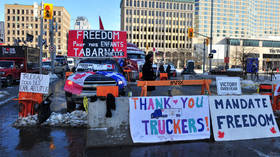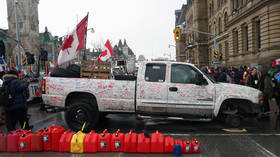By Carlos Osorio, Steve Scherer and Doina Chiacu
WINDSOR, Ontario/OTTAWA/WASHINGTON (Reuters) -Canadian Prime Minister Justin Trudeau promised U.S. President Joe Biden on Friday "quick action" to enforce the law against protesters who have blocked a key U.S. trade corridor and damaged auto production in both nations, the White House said.
Truckers angered by coronavirus mandates began occupying Canada's capital last month before crowding dozens of vehicles on Monday near Ontario's Ambassador Bridge, North America's busiest land border crossing and a choke point for Detroit's carmakers.
Officials are diverting cargo to stem losses after cuts by Ford Motor Co, General Motors Co, Chrysler parent Stellantis and Toyota Motor Corp.
Canada's Ontario province declared a state of emergency on Friday and threatened to fine and jail protesters if they don't leave.
Piling on to earlier calls for action by U.S. officials and business leaders, Biden expressed his concerns over plant closures and production slowdowns during the phone call with Trudeau, the White House said in a statement.
"The two leaders agreed that the actions of the individuals who are obstructing travel and commerce between our two countries are having significant direct impacts on citizens' lives and livelihoods," the statement said.
"The Prime Minister promised quick action in enforcing the law, and the President thanked him for the steps he and other Canadian authorities are taking to restore the open passage of bridges to the United States," it added.
Trudeau told reporters that he agreed with Biden that the blockades cannot continue, and that Canadian banks were monitoring financial activity related to the funding of the protests and taking necessary action.
The "Freedom Convoy" protest, launched by Canadian truckers opposing a vaccinate-or-quarantine mandate for cross-border drivers, is also occupying areas outside government buildings in the capital city of Ottawa and has blocked two smaller U.S. crossings.
The protest has inspired similar convoys and plans in France https://www.reuters.com/world/europe/french-freedom-convoys-head-towards-paris-police-checkpoints-2022-02-11, New Zealand, Australia and the United States, whose Department of Homeland Security is working to ensure that a "Freedom Convoy" event due in early March in Washington, D.C., "does not disrupt lawful trade."
Biden's administration had earlier urged Canada to use federal powers to ease the Ambassador Bridge blockade, a step Prime Minister Justin Trudeau's government has not taken. Trudeau said on Friday his government was not contemplating calling in the military over the protests.
JAIL THREATS, AUTO CUTS
The leader of Ontario, where police have avoided using force to disperse protesters, sought to build pressure on Friday by threatening C$100,000 fines and up to a year in prison for non-compliance.
Announcing the penalties as part of emergency measures, Ontario Premier Doug Ford said they were needed to "make crystal clear it is illegal and punishable to block and impede the movement of goods, people and services along critical infrastructure."
Ford said protesters had "attempted to disrupt our way of life by targeting our lifeline for food, fuel and goods across our borders," and that they were "trying to force a political agenda through disruption, intimidation and chaos."
It was not immediately clear if and when authorities would begin issuing fines or seeking jail sentences. A Canadian mayor whose city abuts the bridge sought a court injunction physically removed on Thursday to have the protesters removed.
With car production cuts mounting, Ford, the second-largest U.S. automaker, said on Friday it had temporarily halted work at its assembly plant in Ohio. It warned in a statement of a widespread impact on all automakers in both nations.
The stock of Canadian autoparts maker Magna International fell 4.4% on Friday after it said it had seen an initial hit from the bridge's closure.
General Motors and Toyota also announced new production cuts.
Governor Gretchen Whitmer of Michigan, home to nearly a fifth of all U.S. car production, told CNN: "The Canadian government has to do whatever it takes to safely and swiftly resolve this."
Trudeau says he is working with municipal leaders to end the blockade. His intergovernmental affairs minister, Dominic LeBlanc, said Canada has been "very engaged" with its U.S. partners over the crisis.
"Just because somebody doesn't agree with a particular public-health measure doesn't entitle them to damage hundreds of millions of dollars of cross-border trade, or create enormous disruption and abuse on the streets of the nation's capital," LeBlanc told reporters.
Public Safety Minister Marco Mendicino said federal police had deployed additional units to Ottawa, where officers have made 25 arrests so far. Mendicino was scheduled to speak with U.S. Homeland Security Secretary Alejandro Mayorkas on Friday, his office said.
($1 = 1.2737 Canadian dollars)
(Reporting by Ismail Shakil, Kanishka Singh, Shivansh Tiwary in Bengaluru, Steven Scherer in Ottawa, Anna Mehler-Paperny in Toronto and Doina Chiacu and David Shepardson in Washington; Writing by Rami Ayyub; Editing by Karishma Singh and Mark Porter)
On the ground at a Canadian trucker protest: Reporter's notebook

The joke magnet at the bottom of an Ottawa market rack had suddenly taken on a new meaning, proudly proclaiming "I survived Ottawa traffic!"
What’s at stake as protests continue at the US-Canada border over COVID restrictions
Blocks away, traffic is the new residence for thousands of frustrated Canadians camping out indefinitely in tractor trailers in the shadow of Parliament Hill.
MORE: DHS warns of trucker protests ahead of Super Bowl, but stresses they're aspirational
They've made themselves right at home: grills and smokers serving up freshly cooked food, makeshift clotheslines hoisting soon-to-be frozen pants and elaborate speaker systems leading dance parties at the conclusion of dozens of anti-vaccine, anti-government speeches.
There are twinges of stereotypically Canadian politeness everywhere -- the demonstrators have kept the sidewalks shoveled, and plenty of people would wish us a good day, including a man sporting a pin that read "the media is the virus." Even the police statement issued nearly two weeks in seemed to tread lightly: If you're blocking the streets, you might be committing a crime, and you could, possibly, get arrested.
But even though we were in another country, our walks through the crowds felt overwhelmingly familiar: the sloganeering about freedom, the anecdotes of vaccines gone bad, the ever-encroaching boogeymen of socialism and communism, and even their behavior toward us -- individually pleasant but often communally venomous -- insisting that we, the infamous mainstream media, were only there to lyingly promote our "narrative."MORE: Jan. 6 investigators find gaps in Trump White House call logs, sources say
Swap the maple leaves for stars and stripes, and every scribbled "Trudeau" with "Biden," and you'd swear you were at a QAnon rally in the U.S.

ABC News' Trevor Ault reports from a protest in Ottawa, Canada, where thousands have gathered in tractor trailers to demonstrate against the country's COVID-19 policies.
A common talking point was an insistence that they were not "the fringe minority," a term I heard used repeatedly. One man told me he believed their movement was supported by "probably billions of people."
Based on anecdotal evidence of my own, I think that's unlikely.
From what I could tell, the general consensus around Ottawa outside the protest is that Canada's government has perhaps been heavy-handed in its COVID-19 protocols, but when it comes to public health policies, it was better to be safe than sorry.
Most people understood some of the demonstrators' frustrations, but the excessive vaccine skepticism was a non-starter, and this shutdown was already more disruptive to their lives than a quick QR scan to get into a restaurant.

© Justin Tang /The Canadian Press via APA protester waves the Canadian flag in front of a revving truck on Wellington Street as a protest against COVID-19 restrictions continues in Ottawa, Feb. 10, 2022.
I witnessed one shouting match between a protester and a masked man who was walking by. The protester said he was defending freedom, and how else was he supposed to do that? The masked man replied, "Vote!" The protester paused, then told the man to get lost.MORE: Truck blockade at US-Canadian border shuts auto plants
Now, as new blockades continue to pop up at the border and some provinces with falling caseloads roll back their COVID-19 policies, the protesters are even more certain they are right and even more convinced they'll get what they want. And some of them want even more than policy rollbacks. They want jail time, or even death, for the politicians who instituted the policies in the first place.
Pandemic fatigue and mandate confusion are not necessarily unpopular opinions, but misinformation travels freely -- and it doesn't stop at the border.















